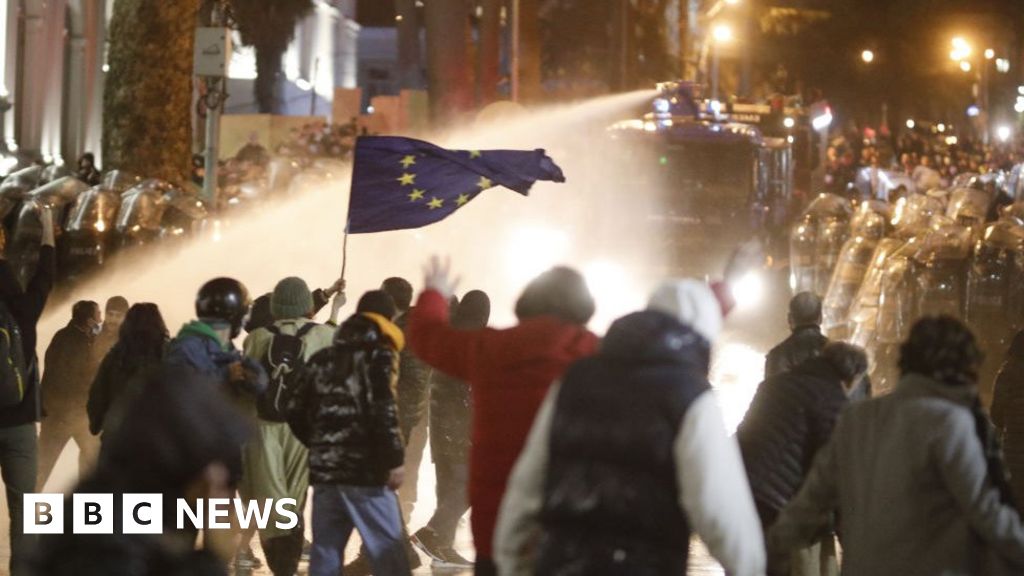
www.bbc.com
Thousands protest at Georgian 'foreign agent' bill
Police fire water cannon and tear gas at protesters who say the new draft law limits press freedom.
International
Protesters have clashed with police in Georgia's capital, Tbilisi, after parliament backed a controversial draft law which critics say limits press freedom and suppresses civil society.
Riot police used water cannon and pepper spray to disperse the crowds outside the parliament building.
Some protesters were seen falling on the ground and coughing, while others waved EU and Georgian flags.
The government said 50 police officers were hurt and police gear was damaged.
Police arrested 66 people, including one of Georgia's opposition leaders, Zurab Japaridze, who was reportedly beaten.
There has been widespread international condemnation of the bill. It would require non-governmental and media organisations that receive more than 20% of their funding from abroad to declare themselves as "foreign agents", or face hefty fines and possible imprisonment.
The opposition says the Russian-style law marks a shift towards authoritarianism and would damage Georgia's chances of joining the EU. Further protests outside parliament have been called for Wednesday.
Hours earlier, police had warned protesters to disperse with a repeated message blaring through loudspeakers. Eventually, officers in riot gear cleared the Rustaveli Avenue, the main thoroughfare outside parliament.
US state department spokesman Ned Price said the draft legislation would be a tremendous setback and "would strike at some of the very rights that are central to the aspirations of the people of Georgia".
The EU is currently considering Georgia's application for candidate status and EU foreign policy chief Josep Borrell warned that the bill was "incompatible with EU values and standards".
Russia passed its own version of a "foreign agents" law in 2012, expanding it over the years to target and suppress Western-funded NGOs and media.
"The law is Russian as we all know... We don't want to be a part of the ex-Soviet Union, we want to be a part of the European Union, we want to be pro-West," one protester told Reuters news agency.
Speaking via video during a visit to New York, Georgian President Salome Zourabichvili voiced her support for the protesters: "I am by your side. Today you represent free Georgia. Georgia, which sees its future in Europe, will not allow anyone to take away this future."
But inside the parliament building, 76 lawmakers from the governing Georgian Dream party gave their initial support to the new "transparency of foreign influence" draft law.
On Monday, scuffles broke out at a committee hearing into the proposed legislation, with one pro-government MP slapping the leader of the largest opposition party.
Passing the law would see Georgia join a list of undemocratic and authoritarian post-Soviet states such as Belarus, Tajikistan and Azerbaijan which have copied the Russian law on restricting the activities of NGOs.
Historically, the term "agent" in Russia and Georgia has the meaning of "spy" and "traitor", giving a negative connotation to the work done by civil society. It suggests they are acting in the interest of foreign forces rather than doing good for the country and society.
The US embassy issued a statement describing Tuesday's vote as a "dark day for Georgia's democracy".
It added that parliament's advancing "of these Kremlin-inspired laws was incompatible with the people of Georgia's clear desire for European integration and its democratic development".
The two bills, on the "transparency of foreign agents" and the "registration of foreign agents", were submitted to parliament by the openly anti-Western People's Power movement, a close ally of the governing Georgian Dream party.
The group has argued that the second bill was an exact analogue of the US Foreign Agents Registration Act (FARA).
Georgian Dream supported the drafts, saying that such laws were needed to improve transparency.
At a briefing on Tuesday evening, the chairman of the governing party, Irakli Kobakhidze, hit back at the US embassy's statement, saying it was "a dark day for the radical opposition and its supporters".
What most protesters and the country's opposition fear is that the adoption of the law would mark an end to Georgia's long-standing ambition to join the EU. More than 80% of Georgia's population supports Georgia's European perspective, which is also enshrined in the country's constitution.
























































